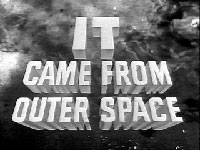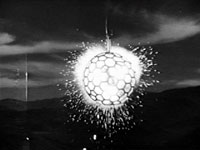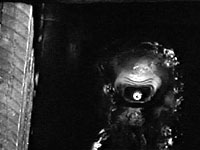PARALLAX REVIEWS:
It Came From Outer Space (1953)
For Space.com


1953 was a strange year. Edmund Hillary and Sherpa Tenzing successfully climbed Everest, the highest mountain in the world, and the House Committee for Un-American Activities tried and executed Julius and Ethel Rosenberg for selling atomic secrets to the Russians. The film industry, bearing the brunt of the attack of Senator Joseph McCarthy, released It Came From Outer Space, a mild form of retaliation against the pervading anti-Communist hysteria.
Based on a Ray Bradbury story (The Comet), this minorly rebellious film opens with a comet-like spaceship crash landing in the Arizona desert. Resident astronomer John (Richard Carlson) and his girlfriend Ellen (Barbara Rush) rush to the crater and view the ship scant minutes before a rock slide buries the extraterrestrial evidence. John's credibility is mocked when the press arrives ("Star Gazer Sees Martians"), and the local sheriff (Charles Drake) tells John that the town has always been suspicious of renegade astronomers living on the outskirts of the desert. They don't much care for people who think different.
John and Ellen leave in a huff and run down a gargantuan, protoplasmic eyeball blocking the highway. This is one of the inhabitants from the ship. It dodges them and is run over again the next day by two telephone repairmen, Frank (Joe Sawyer) and George (Russell Johnson, who will later make one of those Faustian film bargains and reign as the smartest man on a desert isle). The aliens holds Frank and George hostage and replicate them, in an effort to stroll undetected into town for spaceship repair parts. John isn't fooled (the aliens stare unblinkingly into the sun) and corners them in a dark alley. They warn him off after reassuring him that they're not interested in acquiring minds or souls; they just want to repair their ship in peace and leave.
Talk is cheap. John waits almost a full minute before running to the sheriff and telling him about the aliens walking among us. Matt is skeptical, but changes his mind after Ellen turns up missing. John confronts the alien-Ellen, which he bullies into emerging, undisguised. She emerges in full orbital splendor, causing John to cower and run.
Fed up with the aliens, Sheriff Matt stomps meaningfully on a spider and tells John that he'll kill anything he doesn't understand. Ignorance is contagious, and the next time alien-Frank wanders into town he's killed by the Sheriff's quickly-rallied mob. John runs off to warn the other aliens, who are nearing completion on their ship. Depressed, the aliens consider redirecting the ships power towards the destruction of Earth. John pleads instead for the release of the human hostages and buys time for the aliens by sealing the entrance with dynamite. The lynch mob arrives and is greeted with the sight of the departing spaceship, as John sagely notes "It wasn't the right time for us to meet. They'll be back."


Fear of the unknown pervades both the McCarthy trials and It Came From Outer Space. The aliens, composed of a sole, ever watchful cycloptic eye, have Orwellian Big Brother overtones (1984 was written a few years earlier, in 1949). The aliens are seemingly omniscient and their need for secrecy drastically undermines their credibility in town. Their spaceship is hidden, their physical nature is masked and they sneak into private houses and steal clothes, leaving trails of eye slime. Their very acts cry espionage. They've conquered space travel and are quite possibly able to unlock secrets of the inner human soul, ones that humanity may not be ready to hear. As a final threat, the aliens can walk among us undetected, always observing with their unblinking stare. The seeds of paranoia are germinated.
To a lesser degree, John uses a similar frightful gaze - his gigantic eye (telescope) - in his observation of the night sky. This time, the fear of the unknown is space, and John (and, by extrapolation, all scientists) is viewed as a town oddity. Hints of John's supposedly unhealthy influence on Ellen are alluded to by the Sheriff, and it's not too far of a stretch to see the townsfolk lynching John shortly after the aliens depart. Extend this xenophobia, and you have the roots of the McCarthy era, a time where the Bill of Rights was flagrantly disregarded in an effort to isolate those outside the norm. Such conservatism isn't surprising in a post-war country, but is antithetical to advances in science.
Perhaps the final message of 1953 is this: if we can make it to the top of the largest peak on Earth, perhaps we can make it to the stars. Just beware the humans along the way.
Links Away: